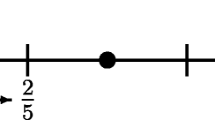Abstract
This article explores the extent to which a decision maker's probabilities can be measured separately from his/her utilities by observing his/her acceptance of small monetary gambles. Only a partial separation is achieved: the acceptable gambles are partitioned into a set of “belief gambles,” which reveals probabilities distorted by marginal utilities for money, and a set of “preference gambles,” which reveals utilities reciprocally distorted by marginal utilities for money. However, the information in these gambles still enables us to solve the decision maker's problem: his/her utility-maximizing decision is the one that avoids arbitrage (i.e., incoherence or Dutch books).
Similar content being viewed by others
References
Aumann, R. (1974). “Subjectivity and Correlation in Randomized Games,”Journal of Mathematical Economics 1, 67–96.
Aumann, R. (1987). “Correlated Equilibrium as an Expression of Bayesian Rationality,”Econometrica 55, 1–18.
Brennan, M. (1979). “The Pricing of Contingent Claims in Discrete Time Markets,”Journal of Finance 24(1), 53–68.
Cox, J., and S. Ross. (1976). “The Valuation of Options for Alternative Stochastic Processes,”Journal of Financial Economics 3(1/2), 145–166.
de Finetti, B. (1937). “La Prévision: ses lois logiques, ses sources subjectives,”Annals Institut Henri Poincaré 7, 1-68. Translation reprinted in 1980 in H.E. Kyburg and H.E. Smokler (eds.),Studies in Subjective Probability, 2nd ed. New York: Robert Krieger, 53–118.
de Finetti, B. (1974).Theory of Probability, Vol. 1. New York: Wiley.
DeGroot, M. (1970).Optimal Statistical Decisions. New York: Wiley.
Drèze, J. (1970). “Market Allocation Under Uncertainty,”European Economic Review 2, 133–165. Reprinted in Drèze, 1987.
Drèze, J. (1987).Essays on Economic Decisions Under Uncertainty. Cambridge University Press.
Feynman, R., R. Leighton, and B. Sands. (1965).Lectures on Physics, Vol. 3. Reading, MA: Addison-Wesley.
Fishburn, P.C. (1973). “A Mixture-Set Axiomatization of Conditional Subjective Expected Utility.”Econometrica 41, 1–25.
Fishburn, P.C. (1982).The Foundations of Expected Utility. Dordrecht: D. Reidel.
Gale, G. (1960).The Theory of Linear Economic Models. New York: McGraw-Hill.
Garman, M. (1979). “A Synthesis of the Pure Theory of Arbitrage.” Working Paper No. 98, Institute of Business and Economic Research, University of California, Berkeley.
Harsanyi, J. (1967). “Games with Incomplete Information Played by ‘Bayesian’ Players: I–III,”Management Science 14, 159–182, 320–334, 486–502.
Hildreth, C. (1979). “An Expected Utility Model of Grain Storage and Hedging by Farmers.” Technical Bulletin 321, Agricultural Experiment Station, University of Minnesota.
Kadane, J.B., and P.D. Larkey (1982). “Subjective Probability and the Theory of Games,”Management Science 28(2), 113–125.
Kadane, J.B., and R.L. Winkler. (1988). “Separating Probability Elicitation from Utilities,”Journal of the American Statistical Association 83, 357–363.
Karni, E., D. Schmeidler, and K. Vind, (1983). “On State-Dependent Preferences and Subjective Probabilities,”Econometrica 51, 1021–1031.
Karni, E. (1985).Decision Making Under Uncertainty: The Case of State-Dependent Preferences. Cambridge: Harvard University Press.
Karni, E. (1992). “Subjective Probabilities and Utility with Event-Dependent Preferences,”Journal of Risk and Uncertainty 5(2), 107–125.
Krantz, D., R. Luce, P. Suppes, and A. Tversky. (1971).Foundations of Measurement, Volume 1: Additive and Polynomial Representations. New York: Academic Press.
Nau, R., and K. McCardle. (1990). “Coherent Behavior in Noncooperative Games,”Journal of Economic Theory 50(2), 424–444.
Nau, R., and K. McCardle, (1991). “Arbitrage, Rationality, and Equilibrium,”Theory and Decision 31, 199–240.
Nau, R. (1992a). “Joint Coherence in Games of Incomplete Information,”Management Science 38(3), 374–387.
Nau, R.F. (1992b). “The Relativity of Subjective and Objective Correlated Equilibria.” Working paper, Fuqua School of Business, December 1992.
Nau, R. (1994). “The Incoherence of Agreeing to Disagree.”Theory and Decision, forthcoming.
Ross, S. (1976). “Return, Risk, and Arbitrage,”Risk and Return in Finance, I. Friend and J. Bicksler, Eds., Cambridge: Ballinger.
Rubinstein, M. (1976). “The Valuation of Uncertain Income Streams and the Pricing of Options,”Bell Journal of Economics and Management Science 7, 407–425.
Savage, L.J. (1954).The Foundations of Statistics. New York: Wiley.
Schervish, M.J., T. Seidenfeld, and J.B. Kadane. (1990). “State-Dependent Utilities,”Journal of the American Statistical Association 85(411), 840–847.
Smith, J.E., and R.F. Nau. (1994). “Valuing Risky Projects: Option Pricing Theory and Decision Analysis,”Management Science, forthcoming.
Varian, H. (1987). “The Arbitrage Principle in Financial Economics,”Journal of Economic Perspectives 1, 55–72.
von Winterfeldt, D., and W. Edwards. (1986).Decision Analysis and Behavioral Research. Cambridge University Press.
Yaari, M. (1985). “On the Role of ‘Dutch Books’ in the Theory of Choice Under Risk.” Nancy Schwarz Memorial Lecture, Northwestern Univesity.
Author information
Authors and Affiliations
Rights and permissions
About this article
Cite this article
Nau, R.F. Coherent decision analysis with inseparable probabilities and utilities. J Risk Uncertainty 10, 71–91 (1995). https://doi.org/10.1007/BF01211529
Issue Date:
DOI: https://doi.org/10.1007/BF01211529




